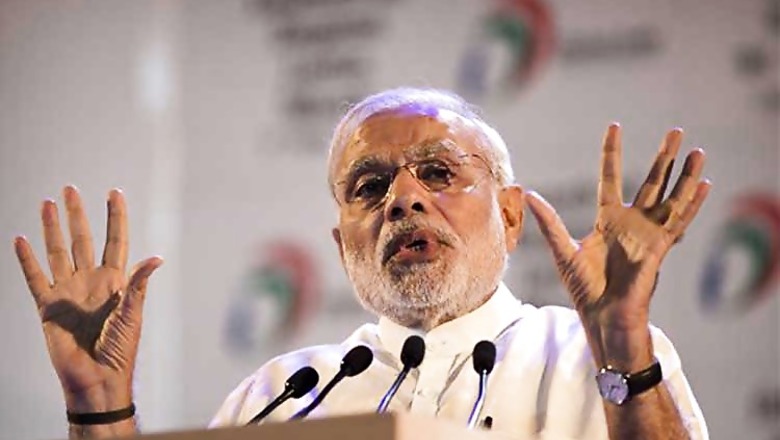
views
Ashgabat: Batting for early implementation of the $10 billion TAPI pipeline project, Prime Minister Narendra Modi on Saturday evinced India's interest in long-term investment in the energy sector in Turkmenistan as the two countries inked seven pacts and vowed to jointly combat terrorism in the region.
During comprehensive talks between Modi and Turkmenistan President Gurbanguly Berdymukhammedov both sides decided to intensify efforts in dealing with threats of terrorism, organised crime and illegal drug-trafficking.
The Prime Minister identified terrorism as a major threat facing the region and said, "We have shared interest in a peaceful and stable Afghanistan and Central Asia. We have also common purpose in combating terrorism and extremism in our region."
After talks between the two sides, a total of seven pacts were signed including an agreement on cooperation in the field of defence and another on tourism.
Calling TAPI (Turkmenistan-Afghanistan-Pakistan-India) project as a significant initiative in relationship between the two countries, Modi said possibility of land-sea route through Iran for the pipeline should be explored.
The project was envisaged to take gas from Turkmenistan, which holds the world's fourth-largest natural gas reserves, to India and Pakistan through Afghanistan.
A joint statement termed the TAPI project a "key pillar" of economic engagement between India and Turkmenistan and said both the leaders recognised that its implementation would have a transformational impact on trade.
It said they decided to take measures for early implementation of this important regional project. The leaders reaffirmed their strong commitment towards timely implementation of this strategic project and noted that the selection of its Consortium Leader, to be finalised by September 1, 2015, would mark a crucial step, it said.
Modi said also expressed India's readiness for long-term investment in the energy sector in Turkmenistan.
"I convey our interest in long-term investment in the energy sector in Turkmenistan," the Prime Minister said. Modi also emphasised the need for enhancing connectivity, calling it a key aspect of the relationship. He also proposed that Turkmenistan becomes part of International North South Transport Corridor.
The Prime Minister arrived in Ashgabat on Friday evening after his three-day visit to Ufa in Russia where he attended the BRICS and SCO Summits besides holding bilateral talks with leaders of Pakistan, Russia and China.
Modi has already visited Uzbekistan and Kazakhstan and is going to Kyrgyzstan and Tajikistan as part of his eight-day visit to Central Asia.
The Prime Minister said he had a "positive discussion" with Berdymukhammedov on India's interest in investment in downstream industries, including petrochemicals and fertilizer. An MoU signed for cooperation in the fertilizer sector will enable long term arrangements for supply of fertilizers from Turkmenistan to India, he said.
The pact on defence would provide a framework for intensifying bilateral defence and security cooperation through exchanges of high and mid-level visits, training and dialogue between the Ministries of Defence and other relevant organisations.
It would also enable capacity-building and technical cooperation, thus imparting a new momentum to the bilateral partnership in the defence sector. The Prime Minister also congratulated Berdymukhammedov
on the 20th anniversary of policy of Permanent Neutrality, an important one for peace and stability in the wider region.
Underlining the need for greater cooperation in the energy sector, Modi welcomed the decision by ONGC Videsh Limited to open an office in Ashgabat.
"We had a very positive discussion on India's interest in investment in downstream industries, including petrochemicals and fertilizer," he said, adding the MoU in the fertilizer sector will enable long-term arrangements for supply of fertilizers from Ashgabat to India.
Laying emphasis on connectivity, Modi thanked Turkmenistan for support to India joining the Ashgabat Agreement on trade and transit. "If we use the Iran route, Ashgabat is the first capital we would reach in Central Asia."
"Together with the Kazakhstan-Turkmenistan-Iran rail link, and India's proposed investment in Chahbahar Port in Iran, these initiatives will strengthen connectivity between our countries," the Prime Minister said, noting "As India deepens its relations with Central Asia, Turkmenistan will play a crucial role in it."
Modi said that the recently inaugurated three-nation railway line could be a linked corridor of the International North South Transport Corridor to streamline movement of goods and commodities between India and Turkmenistan and beyond, a joint statement issued after the talks said.
The two leaders welcomed the Indian proposal to set up a urea production facility in Turkmenistan. The statement said the two leaders also identified communications, information and technology, textile industry, chemical and pharmaceutical industry, construction and agro- processing as potential areas for cooperation.




















Comments
0 comment